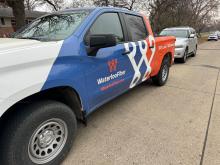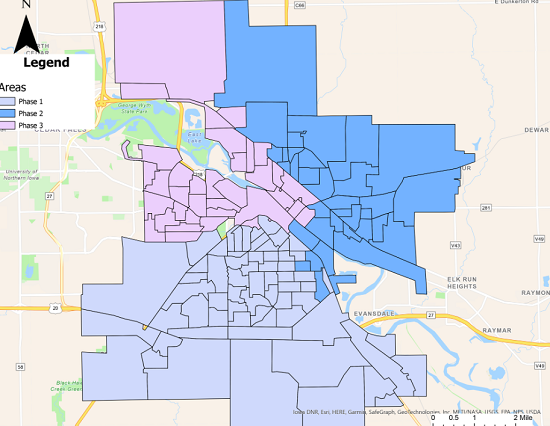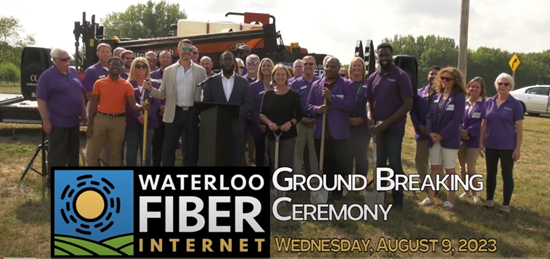
Fast, affordable Internet access for all.

Waterloo, Iowa’s municipal broadband project has taken a major step forward after nearly two decades of planning.
Waterloo Fiber officials just launched their first limited fiber trial, will connect their first commercial customers in February, and are on target to deploy affordable fiber at speeds up to 10 gigabit per second (Gbps) to every last city resident by 2026.
When we last checked in with Waterloo in February of last year, the city was putting the finishing touches on a plan to spend $115 million to build a fiber backbone accessible to all 67,695 Waterloo residents, after locals approved the city issuing general obligation bonds to fund the start of the three-phase construction project.
Construction of the network began last summer at a groundbreaking ceremony hosted by Waterloo Mayor Quentin Hart.
“It will be the lifeline that connects our entire community, enabling businesses to thrive, students to excel and families to stay connected," Hart told attendees. "This fiber system will lay the foundation for a smart city innovation, economic growth and an enhanced quality of life for all our residents."

Last month the city connected the first of four participants in a limited pilot project.
“Right now we are in the testing phase, so we have four subscribers testing the system,” Waterloo Fiber’s Eric Lage told ILSR. “We plan on bringing on permanent paying subscribers in February.”
Waterloo residents have been pondering such a project for the better part of the last two decades. Residents voted in 2005 to create a municipal telecommunications utility despite a well-funded opposition campaign by local incumbent providers. But the project languished for years as the city continued to struggle with expensive, substandard broadband.
But in September of 2022, more than 84% of the 2,762 votes cast voted “yes” on a ballot question asking voters to approve the issuance of $20 million in general obligation bonds to begin construction of a network the city hopes will be transformative.

Lage said that construction will occur in three phases, with each phase taking less than a year.
Southern Waterloo is expected to be completed next fall, northeast Waterloo will follow suit, with northwest Waterloo on deck for deployment in 2025.
“So far there aren’t too many severe challenges we are facing – the project is staying on-budget and our projected timeline for completion by late 2026 is still on track,” Lage said. “Right now we are focusing on making sure the construction quality is up to our standards, and also marketing and communicating with the public about the services that will become available to them in the next few years.”
Locals can track the network’s progress at the Waterloo Fiber website, and advocate for their neighborhood to get deployment priority via the Waterloo “champion” program.
Transformative Pricing And Speeds For A Long-Neglected Community
Like countless U.S. communities, Waterloo suffers from a notable lack of meaningful broadband competition resulting in high prices, spotty coverage, and slow speeds. Locals often have the choice of either Centurylink (Lumen) DSL or Mediacom (XStream) cable broadband.
Mediacom has a track record of attempting to undermine community broadband efforts using propaganda and misleading arguments, and in 2020 unsuccessfully lobbied for state legislation attempting to eliminate municipal authority to offer market-based prices for Internet access.
Centurylink has a history of failing to upgrade aging DSL lines to fiber at any real scale. And while the company has promised to step up fiber deployment, availability remains scattered within the city limits, leaving most locals under a monopoly when it comes to next-gen speeds.

Enter Waterloo Fiber, which will offer four different tiers of service, starting with a symmetrical 100 megabit per second (Mbps) tier priced at $30 a month. Should the FCC’s Affordable Connectivity Program (ACP) be saved with another appropriation from Congress to extend the program past April when the fund will be depleted, the entry-level tier will effectively be free of charge for local low-income residents who qualify.
From there, Waterloo residential customers have the option of symmetrical 300 Mbps service for $50 a month; symmetrical 1 Gbps service for $70 a month; or symmetrical 10 Gbps service for $110 a month. Business subscribers have the option of symmetrical 300 Mbps service for $110 a month, symmetrical 1 Gbps for $250; or symmetrical 10 Gbps for $290 a month.
Waterloo residents also have the option of bundling phone and television service at a variety of price points notably lower than Centurylink or Mediacom. Unlike numerous larger telecoms, the service tiers do not feature long-term contracts, hidden fees, or usage caps.
"We have no hidden fees, your bills are not a moving target, and that's due to us being community owned. We don't cut a profit," Lage told a local NBC affiliate last summer. "We don't take profits and ship them out to shareholders 1000 miles away. All of your dollars stay right here in Waterloo."
Another Project Greatly Aided By Federal Coronavirus, Infrastructure Grants
Waterloo’s efforts were made possible, in part, by a $1.8 million grant funded by the American Rescue Plan Act (ARPA). When announced last year by the Commerce Department, Assistant Secretary of Commerce for Economic Development Alejandra Castillo noted the grant would be matched by $667,682 in local funds and create more than 177 new local jobs.

Waterloo officials say they’re also exploring numerous additional grant opportunities, including tapping into Iowa’s $415 million portion of the $42.5 billion Broadband Equity Access & Deployment (BEAD) program, made possible by the 2021 federal Infrastructure Investment and Jobs Act (IIJA).
Waterloo’s efforts are the culmination of years of not only trying to get network logistics and financing right, but fending off large providers hellbent on protecting their lucrative regional monopolies over technology increasingly viewed as an essential utility.
“The city sees it as an important asset for economic development and quality of life, driving more growth and job opportunities throughout the coverage area, and ensuring every resident of Waterloo is never left behind,” the Waterloo website proclaims.
Header image of Waterloo Fiber truck courtesy of Waterloo Fiber LinkedIn page
Inline image of Mayor Hart with first Waterloo Fiber subscribers courtesy of Waterloo Fiber LinkedIn page
